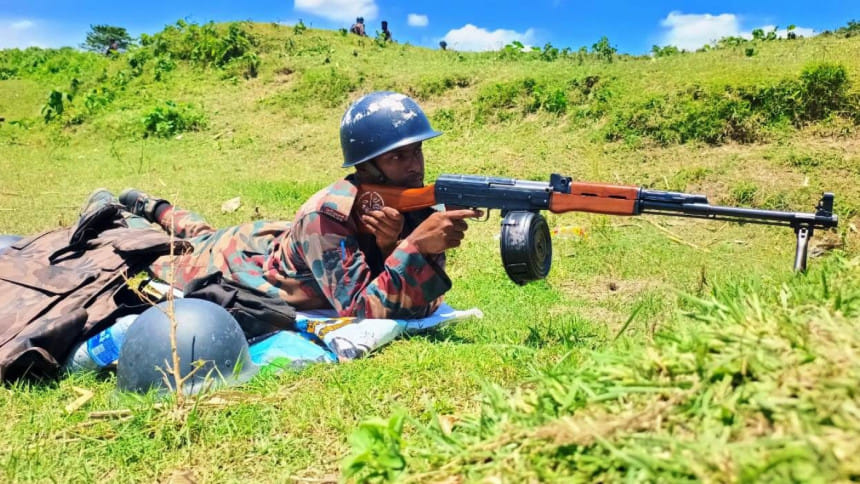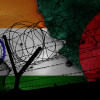Those pushed-in allege torture, abuses in India

A Bangladeshi woman has alleged that India's Border Security Force (BSF) tied empty plastic bottles to her and her three daughters to keep them afloat, then pushed them into the Feni river along the Tripura border in the dark of night, in a chilling account of abuse at the border.
Selina Begum, 41, said she and her three daughters floated in the water all night before being rescued by locals in Khagrachhari's Ramgarh on May 22.
"They kept us in custody for the next three days without food or water. Then they drove us to the border and pushed us across the fence around 3:00am."
"They tied bottles to our waists and threw us into the river," she told The Daily Star.
"My children had no idea what was happening. We floated all night. None of us know how to swim," she said.
Selina, her husband Ummed Ali, 47, and their daughters Rumi Khatun, 16, Rumpa Khatun, 15, and Sumaiya Khatun, 6, were later found cold and exhausted by locals near the Sonai Pool area around 6:00am on May 22 and taken into custody by Border Guard Bangladesh (BGB) members from the Mahamuni camp.
The family members said they were working as labourers in Haryana when Indian authorities detained them.
After holding them overnight, the authorities drove them to the border, robbed them of their money and phones, and then pushed them into the river.
"We just kept drifting in the darkness. They didn't even care that there were children with us," said Ummed.
Rana, a local who first spotted the family, said, "They were clearly in shock. The children looked frightened and freezing. We immediately called the BGB."
What happened to this family is not an isolated case.
Several Bangladeshi nationals have alleged that Indian authorities tortured them prior to pushing them across the border.
A 45-year-old woman, requesting anonymity, said she had been living in India for the last 10 years.
On May 10, she and her husband were detained and taken to a Delhi police station along with 46 others.
"They kept us in custody for the next three days without food or water. Then they drove us to the border and pushed us across the fence around 3:00am," said the woman.
Since May 7, at least 1,053 individuals have been pushed into Bangladesh from India through different border points, according to a statement from BGB headquarters.
The statement said 111 people were pushed in through borders in Khagrachhari, 84 through Kurigram, 103 through Sylhet, 331 through Moulvibazar, 19 through Habiganj, 16 through Sunamganj, two through Dinajpur, 17 through Chapainawabganj, 19 through Thakurgaon, 32 through Panchagarh, 75 through Lalmonirhat, 19 through Chuadanga, 42 through Jhenaidah, 13 through Cumilla, 39 through Feni, 23 through Satkhira, and 30 through Meherpur.
As many as 78 individuals were reportedly pushed in through the remote Mandarbaria area of the Sundarbans.
Maj Gen Mohammad Ashrafuzzaman Siddiqui, director general of BGB, told The Daily Star that despite repeated protests conveyed through flag meetings and diplomatic channels, incidents of push-ins by BSF and other Indian agencies have regrettably continued.
"BGB remains on high alert and has intensified surveillance and patrols in sensitive border areas. However, during recent engagements, the neighbouring authorities denied any such push-ins—denials that contradict facts and constitute both a violation of human rights and glaring falsehoods," he said.
Siddiqui noted that many of those pushed back are Bangladeshi nationals who had lived in India for years.
Some of their children were born in India and held Indian documents, which were forcibly taken from them, he said.
"We have consistently stressed that such unilateral actions violate established repatriation procedures and bilateral norms. BGB continues to urge transparent, verifiable processes to address these cases in line with international standards," he added.
On May 7, five UNHCR (India)-registered Rohingya refugees were also pushed in through the Kurigram border after being forcibly relocated.
"These recurring incidents are deeply concerning. Victims have reported inhumane treatment, including detention, confiscation of documents, and even physical abuse prior to being pushed across the border," he added.
"BGB documents each case thoroughly, collecting personal testimonies and visual evidence, which are shared through proper channels."
The five Rohingyas registered with UNHCR in India were detained by a BGB team around 6:00am on May 7 from near the border in Kurigram.
BGB officers recovered five UNHCR registration cards issued by the agency's New Delhi office from their possession.
During preliminary questioning, the detainees, all members of a family, said they fled Myanmar two years ago and had been living in the Matia camp in Assam.
On reports of Indian authorities pushing undocumented individuals across the border, Brig Gen Md Nazim-ud-Daula, director of the Military Operations Directorate of the Army, said: "Push-ins are unacceptable. BGB is handling it efficiently, and if needed, the army will step in under government instruction."

 For all latest news, follow The Daily Star's Google News channel.
For all latest news, follow The Daily Star's Google News channel. 








Comments